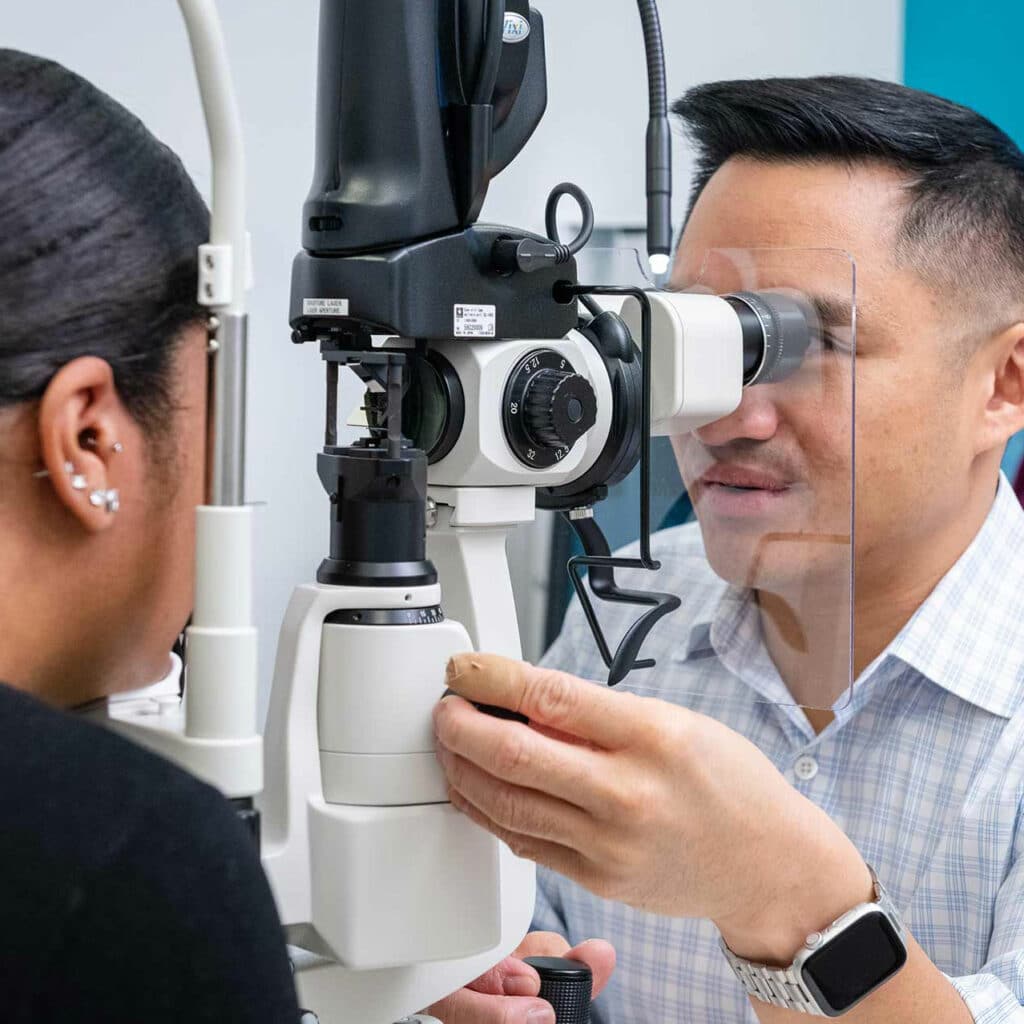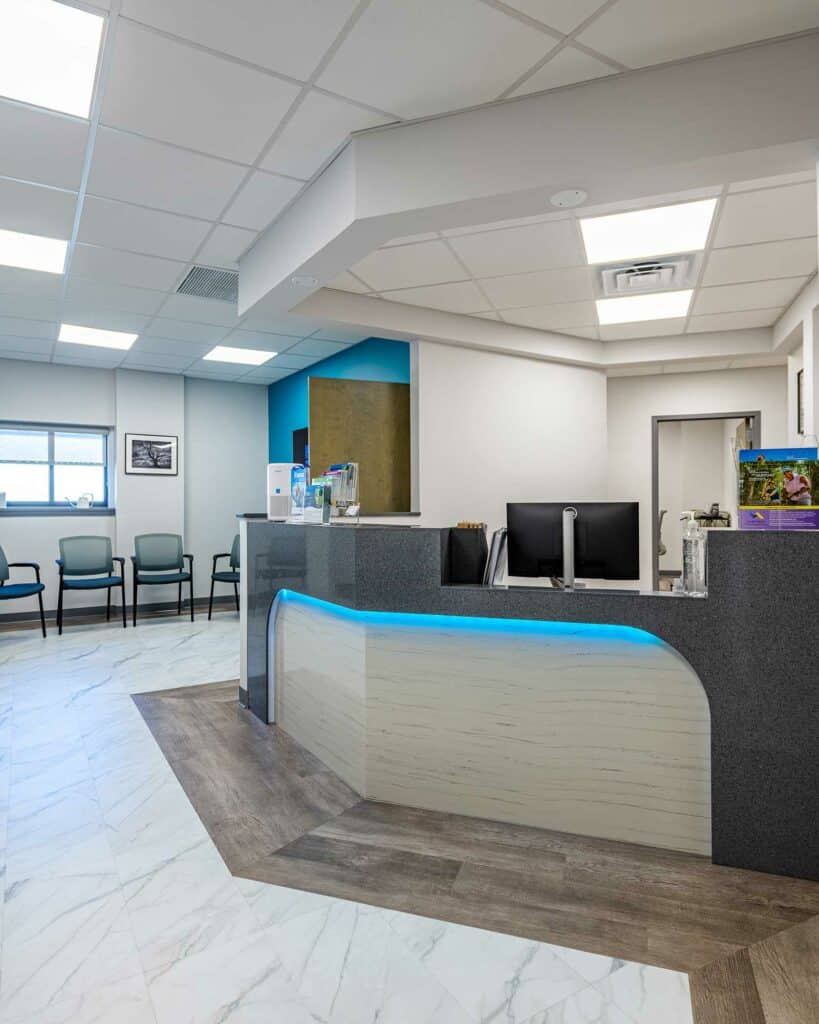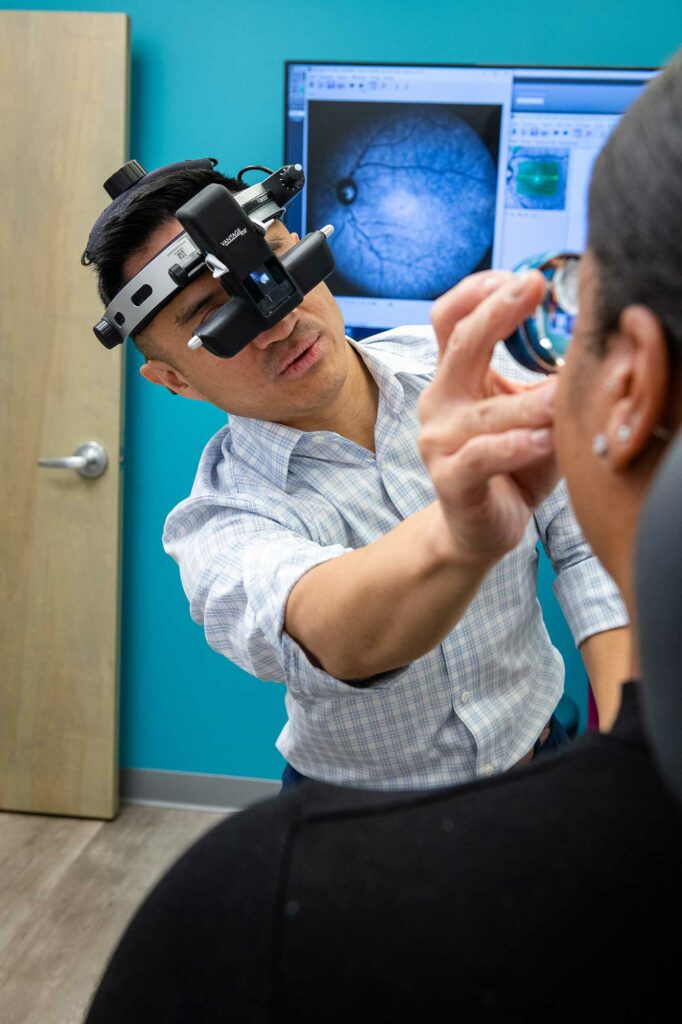Enjoy complimentary valet parking at our Queens, NY office!
Complimentary valet at our Queens office
Enjoy complimentary valet parking at our Queens, NY office!
Complimentary valet at our Queens office


A typical appointment begins with testing, including a vision check, eye pressure check, pupil dilation, and any necessary imaging or injections.
Testing is typically quick and painless (really!).
After reviewing your results and imaging, we discuss next steps and answer your questions.
Many retina conditions call for eye injections, which we can administer with minimal discomfort in-office.
As we develop your management plan, our goal is to “treat and extend.”
We aim for minimal but effective treatments over time to maintain control of your condition and keep your eyes healthy and happy.

Your eyes are complex organs, and your treatment depends on your condition and your particular needs.
Although we take a highly sophisticated approach to your care, we’re also here to help you understand your condition and your treatment plan in a clear, accessible way. For information about the conditions we treat, please explore the sections below.
Macular degeneration is a common and treatable condition that causes loss in the central vision. It’s important to know the type of macular degeneration you’re experiencing, to customize your treatment accordingly.
“Dry” macular degeneration (technically known as “nonexudative” macular degeneration) can be treated through monitoring and a specific regimen of dietary supplements. While the supplements can’t cure or reverse the condition, they can play a key role in slowing down the rate of progression. If this is the case for you, we can teach you to self-monitor your vision and typically will evaluate your vision twice a year.
“Wet” macular degeneration (technically known as “exudative” macular degeneration) requires ongoing treatment and active intervention. Typically, management of this condition requires eye injections every 1-4 months, tailored to the particular condition of your eye.
Diabetic retinopathy is an eye condition that can cause vision changes or vision loss in people who have diabetes. It affects the blood vessels in the retina, and may be present with or without symptoms.
Early stage diabetic retinopathy (technically known as “nonproliferative” diabetic retinopathy), when you have no symptoms of the condition, may be treated with careful management of your diabetes and monitoring for vision changes. In some cases, such as if your vision is affected by diabetic macular edema, injections might be recommended to stabilize the conditions.
Advanced diabetic retinopathy (technically known as “proliferative” diabetic retinopathy), when you have or are experiencing vision changes, requires active treatment. It’s typically treated with regular eye injections or laser therapy. After evaluating your condition, we’ll guide you with the treatment method that we specifically recommend for you.
Vascular occlusions are similar to a stroke in the retina. Vascular occlusions can occur due to risk factors including high blood pressure, diabetes, hypercoagulability (increased blood clotting), or other inflammatory conditions.
Depending on the cause and severity of your vascular occlusions, your treatment may include laser treatment, injections, or surgery. Thorough testing will help us determine the best treatment plan for you.
Posterior vitreous detachment is a natural change in the eye as you age. This condition, usually first noticeable due to persistent flashes and floaters, should be monitored to ensure that a retinal tear is not involved.
Tears in the retina can happen for various reasons and occur with different degrees of severity. Sometimes retinal tears can occur after posterior vitreous detachment, or due to other eye trauma or risk factors.
Retinal tears should be assessed urgently to prevent retinal detachment, and are typically treated with laser retinopexy treatment or cryopexy.
Retinal detachment, which occurs when your retina is pulled away from its normal position, requires urgent treatment. This condition is rare but treatable (ideally within a few days of diagnosis) and typically requires surgery.
Pneumatic retinopexy, a surgical treatment that injects gas into your eye, is a procedure that is often recommended for some retinal detachments and can be safely and successfully performed in-office. This treatment is coupled with laser treatment, cryopexy (a freezing treatment), or additional surgery.
Specific positioning in your recovery is required for repair of a retinal detachment. Depending on the nature of your surgery, you may be required to remain face-down for one week or in an elevated head position. We’ll discuss your recovery requirements with you in detail to help you prepare and put your mind at ease.
Macular pucker can occur when a membrane develops on the macula (the center of the retina) as you age, resulting in distorted vision. Macular pucker can be treated with surgery through an outpatient procedure known as a vitrectomy, when your ophthalmologist removes the scar tissue affecting your vision.
Macular hole can occur as the macular tissue on your eye stretches as you age, leading to loss of central vision with a central blindspot. Macular hole can be treated through a surgical procedure that alleviates the pulling on the macula to allow the hole to close.
Specific positioning in your recovery is required to repair macular hole: typically you will need to maintain a face-down position for one week. We’ll discuss your recovery requirements with you in detail to help you prepare and put your mind at ease.
No matter your condition, your doctor will conduct a thorough exam and testing to determine the best course of treatment for you, personalizing your care to best preserve your vision.
With 10+ years specializing in retina care and creating lasting relationships with thousands of my patients, I take a collaborative approach to your care. Although I care for retinas every day, I understand that your condition doesn’t feel routine to you!
At every appointment and through testing and treatment, I prioritize helping you understand your condition and care plan, answering your questions, and working diligently to preserve your vision.


Because many retina conditions require long-term treatment, a positive, long-term relationship with a doctor you trust makes all the difference. You’ll see Dr. Coe personally at every appointment.
Yes, because this is how we evaluate your retina. We use medicated drops to dilate your pupils, and it usually takes about 15-30 minutes before your pupils are ready for your eye exam.
Dilating your pupils will make you temporarily more sensitive to light, so it’s a good idea to have sunglasses with you on the day of your appointment. Since everyone experiences pupil dilation a bit differently, it may also be a good idea to plan on having a companion drive you home after your appointment.
Most retinal treatments can be easily and safely administered as outpatient procedures on-site in our medical office. For surgeries that need to take place in a surgical operating room, Dr. Coe operates at Gramercy Surgery Center in Queens.
There are many types of retinal conditions, each with their own unique nuances. If you don’t see your condition here, please call our office at (646) 828-8660 and we can provide more specific guidance.
ClearView Retina is in network with the following insurers:
Unsure about your eligibility, or whether your particular plan is included? Please call us at (646) 828-8660 and we can help you determine your eligibility.
We do not require patients to have a referral from another doctor to be seen, but we welcome referrals if your health insurance requires one prior to your appointment.
We’re currently accepting new patients – please call our office at (646) 828-8660 to schedule your appointment.
2391 Bell Boulevard
Suite 204
Bayside, NY 11360
(646) 828-8660
f: 718-764-6296
© 2025 ClearView Retina Medical Care, PLLC
We use Accessibility Checker to monitor our website's accessibility
Brand Development by Atelier LKS